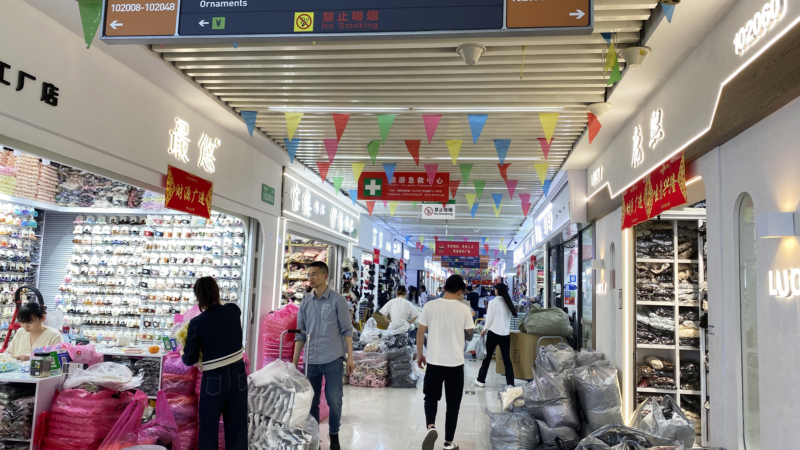What U.S. tariffs look like from a Chinese trade city
Almost any American store or home has goods in it made in China, but I never thought I could visit a single place where much of it is sold.
Yiwu International Trade City, a giant wholesale market in Yiwu, China, is the clearinghouse for millions of Chinese-made items.
The market does not generally handle high-end products like Apple iPhones. Rather, it is the source of stuff you find for sale beside the checkout counter in an American store, or in the drawers of your home — such as hairpins, stuffed animals, plastic toys, pots and pans, light bulbs, umbrellas, hammers and press-on nails.
All these products are made by factories in the region, shipped to Yiwu, and soon shipped onward to countries around the world.
The Yiwu market was worth exploring for its own sake, and gave us some insight into the various ways that China’s businesspeople are adjusting to U.S. tariffs. You can listen to our experience at the button above and read on below to meet four of the people our team encountered.
The Family Businesswoman

Wang Nan operates a wholesale shop high in one of the buildings of the market. The products on the wall include spades, saws, caulk guns, garden shears, bolt cutters, garden hose nozzles, drill bits, levels — essentially anything made of metal that you’d find in a hardware store.
“I came to Yiwu in 2000,” she said. “After I saw all kinds of goods that I had never seen before, I didn’t want to leave.”
She started in printing, but her relatives manufacture hardware, and she became their distributor with a global business. While we visited, two men from Senegal came in to place an order. Many of their products go to a company in suburban New York City.
She wants to pass the business to her 25-year-old daughter, Wang Xiao Nan, or “Little Nan,” who has traveled to Texas and elsewhere to attend trade fairs or meet potential clients.
The mother quoted China’s Chairman Mao, who said that women hold up “half the sky.” She said in Yiwu, women hold up “most of the sky.”
The company aspires to sell even more tools in the U.S., even as tariffs take hold. Wang Nan told us that American customers always need tools, and they’ll just pay a little more. She is aiming to improve the packaging but not to lower her prices.
The Influencer

Retailers who can’t visit the Yiwu market may discover it online through TikTok influencers who work here. One is Zixin Li, known online as Luna.
Like a lot of people in Yiwu, she’s doing what she can to make a buck.
“Previously I did events planning, luxury events, in Shanghai, but you just earn too little,” she said. So she decided to explore “the land of opportunity,” which is how she describes the Yiwu market.
The Hairpin Seller

Nicole Zhang sells hairpins and claw clips. She and her husband started the business in 2011. And as with many people in this market, the modest storefront with its inexpensive products does not indicate the scale of their enterprise. Out in the countryside they have a warehouse filled with more stuff, and beyond that a factory that they own.
Zhang says Target asked her to share half the cost of the tariffs — which the U.S. first set at 10%, and then 20.
She tried to negotiate: “I said maybe 2 or 3% we can share from our profit,” she said.
The 3-D Toymaker

We drove to one of the factories surrounding Yiwu—a business on the upper floor of an industrial building about an hour’s drive away. There we met the owner, Zeng Hao, 33.
Just last year he was trying to make his fortune in cryptocurrency. Then he started a new business, buying some 3-D printers, a common consumer model of the sort that anyone can buy on Amazon and operate at home.
He jammed 20 such printers into his apartment and began producing plastic toys. He used the profits to buy more printers, and then more — as if they were replicating.

When we visited his factory, Zeng Hao said 4,000 printers were operating 24 hours a day, seven days per week.
A small number of human workers operate the machines. And in some cases, they decorate the toys — putting eyes on plastic animals, giving them a “soul,” Zeng said.
I asked Zeng Hao what he dreamed of doing when he was growing up. He said he doesn’t really have dreams.
“I have a life goal now. I do wanna expand my business in this sector because, you know, for our young people, we don’t have much opportunity today compared to our parents.”

In China’s economy, where young people like him struggle, he hopes to expand. And he’s selling everywhere, including the United States.
He says one of his American clients asked him to pick up half the cost of the new U.S. tariffs. He agreed — but he said it doesn’t matter much. Because even with the extra cost, he is raising his prices.
The radio version of this story was produced by Milton Guevara and Aowen Cao. It was edited by Reena Advani.
Transcript:
STEVE INSKEEP, BYLINE: We’ve been visiting the source of your stuff – things like hairpins, pots and pans, toys. A lot of it comes to America through a Chinese trading city called Yiwu. That’s spelled Y-I-W-U, Yiwu. Thousands of wholesalers there ship products from nearby factories. Our tour gave us news how China responds to U.S. tariffs and a picture of life in the world’s second largest economy. The center of the action in Yiwu is a market that I explored with our producer, Aowen Cao.
AOWEN CAO, BYLINE: It says we need to go over there, and, yeah, turn left.
INSKEEP: We were looking for a family-run business, which wasn’t easy. It’s like a giant shopping mall, next to a giant shopping mall, next to a giant shopping mall. We walked inside, and our editor Reena Advani noticed a store that only sells umbrellas.
REENA ADVANI, BYLINE: They’re all made here.
INSKEEP: So there’s an umbrella store. Nothing but umbrellas in there.
ADVANI: And there’s yoga mats, chess. It looks like parasols, all sorts of things here you can find.
INSKEEP: Light bulbs. Like, a light bulb store. That’s what they sell.
Up flight after flight of stairs, we arrived at a wholesaler of hardware.
(SOUNDBITE OF POWER TOOLS)
INSKEEP: I’ve been going around this store just writing down things that are for sale – spades, saws, staplers, caulk guns, garden shears, wire cutters, bolt cutters.
The owner of this shop is Wang Nan. She was wearing a white business suit with silver-pointed shoes.
WANG NAN: (Through interpreter) I came to Yiwu in 2000. After I saw all kinds of goods that I’ve never seen before, I didn’t want to leave.
INSKEEP: She started in printing, but her relatives manufacture hardware. Today, this hardware shop is essentially a display room for her global business. While we visited, two men from Senegal came in to place an order with the woman in the white suit.
NAN: (Through interpreter) He passed a small order that’s a hundred thousand U.S. dollar.
INSKEEP: That’s a small order, $100,000 U.S.?
NAN: (Laughter).
INSKEEP: Wang Nan wants to pass this business to her daughter, Wang Xiao Nan, or little Nan. The mother quotes China’s Chairman Mao, who said that women hold up half the sky, and she contends that in Yiwu they hold up most of the sky. Her adult daughter studied to be an English teacher for a while, but now travels the world for trade fairs and sales, including to Texas. The company aims to sell more in the United States, even as tariffs take hold. Wang Nan insists that American customers always need tools, and they’ll just pay a little more. She says she won’t.
(SOUNDBITE OF TIKTOK)
ZIXIN LI: Hi, boss. If you’re sourcing from China in 2025, make sure you don’t miss out. This tray shells (ph).
INSKEEP: Retailers who can’t visit the Yiwu market may discover it online through TikTok influencers who work here. One is Zixin Li, known online as Luna.
(SOUNDBITE OF TIKTOK)
LI: You know, how it looked like when China’s top perfume factory opens in the world’s largest wholesale market. Let me show you around.
INSKEEP: We met her in person. She’s tall. She’s confident, and she walked through the halls, which were filling up that day with plastic bags – items just delivered from the factories.
Here’s more hairpins.
LI: Yes.
INSKEEP: Thousands and thousands of hairpins. Extra plastic bags full of hairpins.
LI: Hair bands.
INSKEEP: People assembling hairpins for shipment, perhaps.
LI: Yes.
INSKEEP: Around the corner were press-on nails and rows upon rows of stuffed animals, which caught the attention of our producer, Milton Guevara.
MILTON GUEVARA, BYLINE: I do want to get a plushie for my girlfriend.
INSKEEP: You want to get a plushie? Let’s go back and get a plushie. Do you have a minute?
LI: Yes.
INSKEEP: Like a lot of people here, Zixin Li is doing what she can to make a buck.
LI: Previously, I did the event planning. Yeah, it’s like, luxury events.
INSKEEP: Event planning. Oh, OK.
LI: Yeah, in Shanghai. That’s, like, quite popular…
INSKEEP: Sure.
LI: …Subject in Shanghai, but you just earn too little. So it’s easy for me to just explore the land of opportunity. I just…
INSKEEP: Factories pay for her help with sales. As we walk, she introduced us to Nicole Zhang, who sells hairpins and claw clips. She and her husband sell in the U.S., although a client just made a demand. She says Target asked her to share half the cost of the tariffs. She tried to negotiate.
NICOLE ZHANG: And I’ve said maybe 2 to 3% I can share from our profit – yen.
INSKEEP: Two to 3%.
Instead, Target delayed the order.
So are you losing business?
ZHANG: Yeah, kind of lose business.
INSKEEP: Whatever happens, people in this region keep producing more stuff, as we learned when we left the international trading city. We drove into the mountains to one of the factories that surround this area. The early evening sun was a red ball in the smog, but Jinqi Toys was running at full speed, like it always is.
Oh, we are looking at racks upon racks upon racks of 3D printers.
ZENG HAO: Yeah.
INSKEEP: All of them at work, at the same time.
HAO: Yeah.
INSKEEP: What are they making?
HAO: Jewelry and the toys.
INSKEEP: Jewelry and toys.
HAO: Yeah.
INSKEEP: Zeng Hao is the owner. Just last year he was trying to make his fortune in crypto, but then he bought a few 3D printers, the kind you can buy on Amazon and set up on a table in your own home. He started producing plastic toys in his apartment. He made money and bought more printers, which made more money. So he bought more printers – so many he moved to this factory. It’s like the printers are replicating.
How many are in this room?
HAO: It’s about 4,000.
INSKEEP: 4,000 3D printers.
The printers make little plastic fidgets…
(SOUNDBITE OF PLASTIC CLICKING)
INSKEEP: …And colorful plastic toys.
Here’s a little dino…
(SOUNDBITE OF PLASTIC RUSTLING)
HAO: A dino.
INSKEEP: …With many parts to it.
HAO: Yeah.
INSKEEP: It’s cute.
HAO: Yeah.
INSKEEP: A few human workers sit at tables adding eyes to 3D-printed animals.
UNIDENTIFIED WORKER: (Speaking Chinese).
UNIDENTIFIED INTERPRETER: Without eyes, it’s pretty dull. So the workers give them soul.
INSKEEP: Zeng’s most distinctive fidget is two pieces that seem impossible to fit together but do. The production volume also seems impossible.
HAO: (Speaking Chinese).
UNIDENTIFIED INTERPRETER: Forty thousand…
HAO: Yeah.
UNIDENTIFIED INTERPRETER: …A day.
HAO: A day.
INSKEEP: Forty thousand a day?
HAO: Yeah.
INSKEEP: Forty thousand a day?
HAO: Yeah.
INSKEEP: I asked Zeng Hao what he dreamed of doing when he was growing up. He said he doesn’t really have dreams.
HAO: (Through interpreter) I have a life goal now. I do want to expand my business in this sector, because, you know, for our young people, we don’t have much opportunity today compared to our parents.
INSKEEP: In China’s economy where young people struggle, this young man hopes to expand, and he’s selling everywhere, including the United States. He says one of his American clients asked him to pick up half the cost of the new U.S. tariffs. He said, sure, I’ll help, and maybe someday you’ll help me. It doesn’t matter much to him, because even with the extra cost, he says he is raising his prices.
(SOUNDBITE OF MUSIC)
High-speed trains collide after one derails in southern Spain, killing at least 21
The crash happened in Spain's Andalusia province. Officials fear the death toll may rise.
United Nations leaders bemoan global turmoil as the General Assembly turns 80
On Saturday, the UNGA celebrated its 80th birthday in London. Speakers including U.N. Secretary-General António Guterres addressed global uncertainty during the second term of President Trump.
Parts of Florida receive rare snowfall as freezing temperatures linger
Snow has fallen in Florida for the second year in a row.
European leaders warn Trump’s Greenland tariffs threaten ‘dangerous downward spiral’
In a joint statement, leaders of eight countries said they stand in "full solidarity" with Denmark and Greenland. Denmark's Prime Minister Mette Frederiksen added: "Europe will not be blackmailed."
Syrian government announces a ceasefire with the Kurdish-led Syrian Democratic Forces
Syria's new leaders, since toppling Bashar Assad in December 2024, have struggled to assert their full authority over the war-torn country.
U.S. military troops on standby for possible deployment to Minnesota
The move comes after President Trump again threatened to invoke the Insurrection Act to control ongoing protests over the immigration enforcement surge in Minneapolis.







